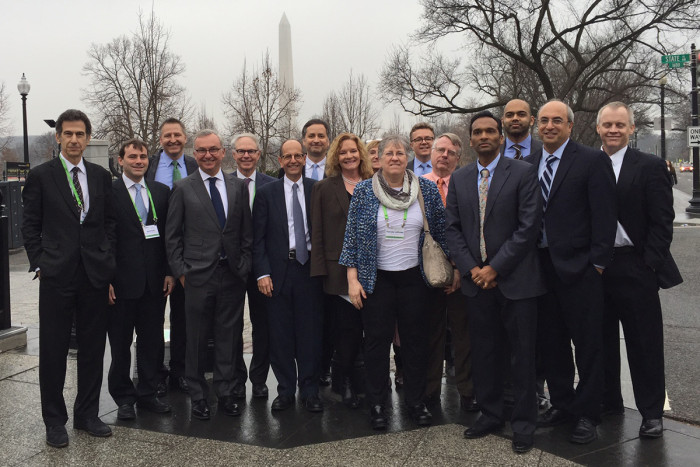Mardis visits White House to discuss cancer research
Co-director of The McDonnell Genome Institute joins other top researchers to discuss challenge to cure cancer

Elaine Mardis, PhD, (center, wearing a dark blazer) joined other scientists and clinicians Jan. 8 to talk with Vice President Joseph Biden’s staff about his “moonshot” challenge to cure cancer.
Elaine Mardis, PhD, co-director of The McDonnell Genome Institute at Washington University School of Medicine in St. Louis, joined a group of 14 other distinguished cancer researchers and physician-scientists Jan. 8 at the White House to talk with Vice President Joseph Biden’s staff about his “moonshot” challenge to cure cancer.
The researchers, convened by the American Association for Cancer Research (AACR), highlighted precision medicine, immunotherapy and other advances against the disease.
“I was really honored to be part of the group of cancer researchers and clinicians invited to discuss these critically important ideas with the vice president’s staff,” said Mardis, who is the Robert E. and Louise F. Dunn Distinguished Professor of Medicine. She also is a member of the AACR Board of Directors and a research member of Siteman Cancer Center at Barnes-Jewish Hospital and Washington University School of Medicine.
Biden, who lost a son to cancer last year, has called for a “national commitment” to end the disease. “And I’m going to spend the next 15 months in this office pushing as hard as I can to accomplish this,” he said in October.
In President Barack Obama’s State of the Union address Jan. 12, Obama said Biden would lead a historic push to find a cure for cancer. He said Biden would be in charge of “mission control” for the effort.
Biden’s staff and the scientists who met with them Jan. 8 discussed AACR initiatives including Project GENIE (Genomics, Evidence, Neoplasia, Information, Exchange), which aims to aid clinical decision-making by linking the genetic profiles of tumors with clinical outcomes.
The visit came after a separate meeting with Food and Drug Administration staff members about next-generation genome sequencing, laboratory-developed tests and diagnostics.
“It’s a very exciting time with the advances being made against cancer,” Mardis said. “By working with our government officials, this progress will continue in a manner that is conducted in the best interests of cancer patients.”






